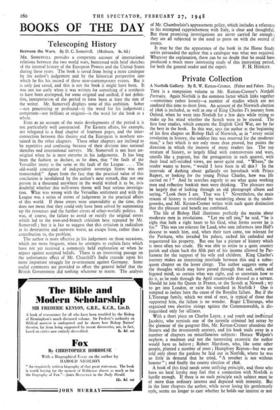BOOKS OF THE DAY
Telescoping History
Between the Wars. By D. C. Somervell. (Methuen. 4s. 6d.)
MR. SOMERVELL provides a competent account of international relations between the two world wars, buttressed with brief sketches of the internal history of the European Powers and the United States during these years. The book is saved from being a mere catalogue by the author's judgement and by the historical perspective into which he fits his record of these near-contemporary events. But it is only just saved, and this is not the book it might have been. It was not too early when it was written for something of a synthesis to have been attempted, for some original and unified, if not defini- tive, interpretation of the period to have been at least the aim of the writer. Mr. Somervell displays none of this ambition. Sober —not penetrating or profound—is the word for his judgement ; competent—not brilliant or original—is the word for the book as a whole.
Even as an account of the main developments of the period it is not particularly well constructed. Far Eastern affairs, for example, are relegated to a final chapter of fourteen pages, and the inter- connection between this theatre and the European is nowhere sus- tained in the other chapters. These other chapters are inclined to be repetitive and confusing because of their division into national sketches and international surveys. Mr. Somervell is not least un- original when he is most extreme in his judgements. It has long been the fashion to declare, as he does, that " the fault of the Versailles treaty is the same as the fault of the League. . . . The old-world conception of independent sovereign States was not transcended." Apart from the fact that the practical value of this conclusion is invalidated by the author's next remark, that not one person in a thousand anywhere in the world wished it to be, iti is doubtful whether this well-worn theme will bear serious investiga- tion. What was wrong with the Versailles settleinent and with the League was a series of errors of judgement in the practical affairs of this world. If those errors were unavoidable at the time, this does not mean that they could only have been solved by summoning up the resources and the further errors of other-worldly politics. It was, of course, the failure to avoid or rectify the original errors which led to the root-and-branch criticism here repeated by Mr. Somervell ; but it is fair to suggest that this criticism is radicalism at its destructive and outworn worst, an escape from, rather than a contribution to, the problem.
The author is more effective in his judgement on those occasions, which are more frequent, when he attempts to explain facts which have not yet received a commonly held explanation or when he argues against accepted beliefs. There is an interesting passage on the unfortunate effect of Mr. Churchill's India crusade upon his more important struggle for re-armament against Germany. Some useful comments are provided to offset the general belief that the British Government did nothing whatever to rearm. The analysis of Mr. Chamberlain's appeasement policy, which includes a reference to his attempted rapprochement with Italy, is clear and thoughtful. But these promising investigations are never carried far enough ; they are all subjected to the need to press on with the record of events.
It may be that the appearance of the book in the Home Study series persuaded the author that a catalogue was what was required. Whatever the explanation, there can be no doubt that he could have produced a much more interesting study of this interesting period,
for both the general reader and the expert. F. H. HINSLEY.


































 Previous page
Previous page